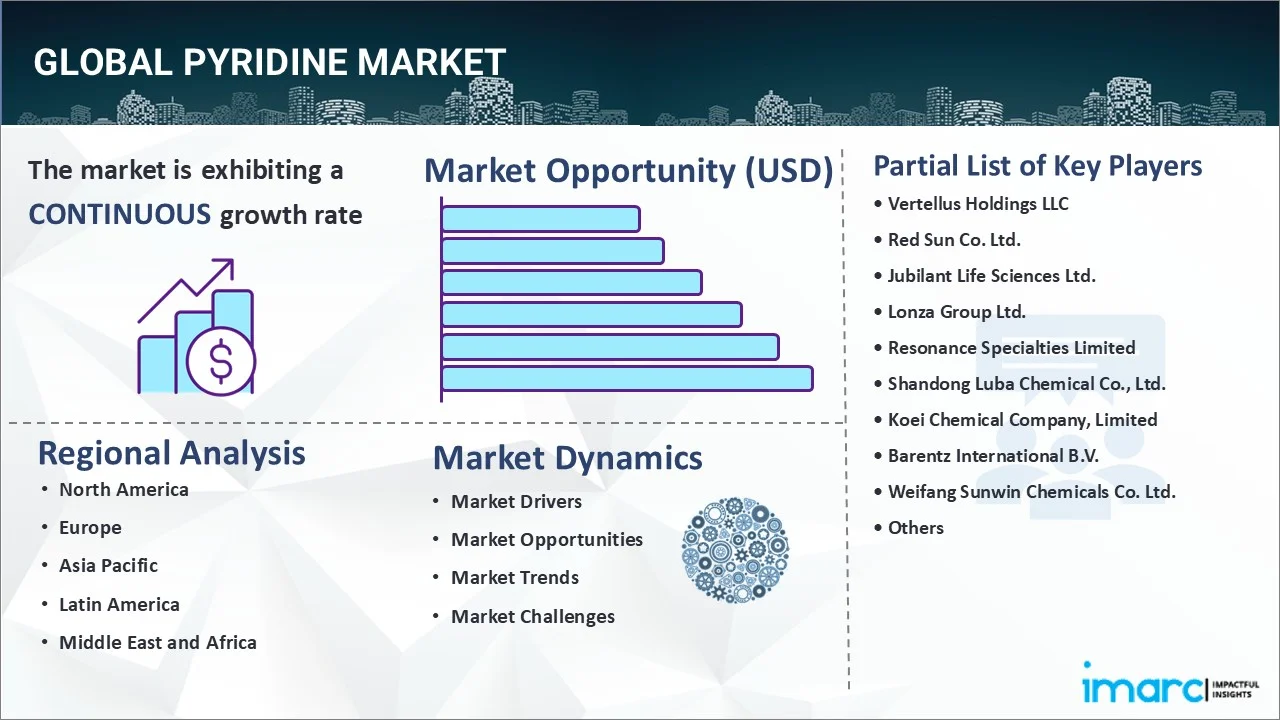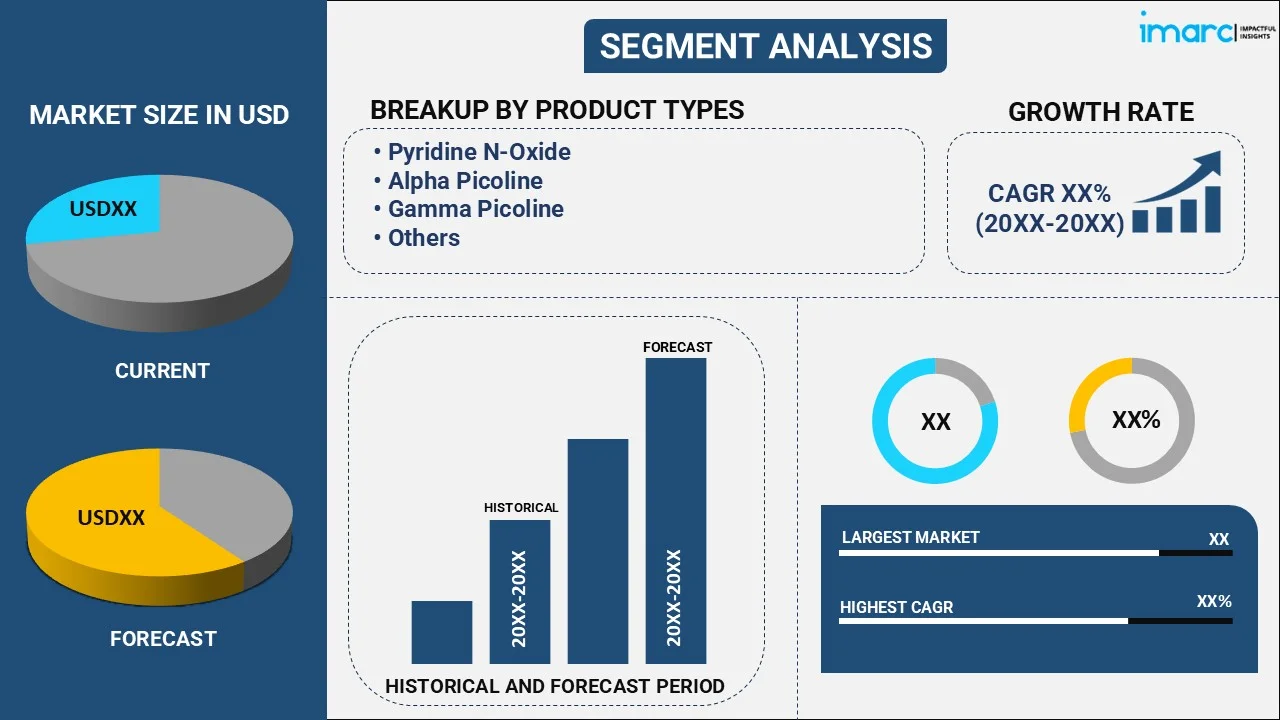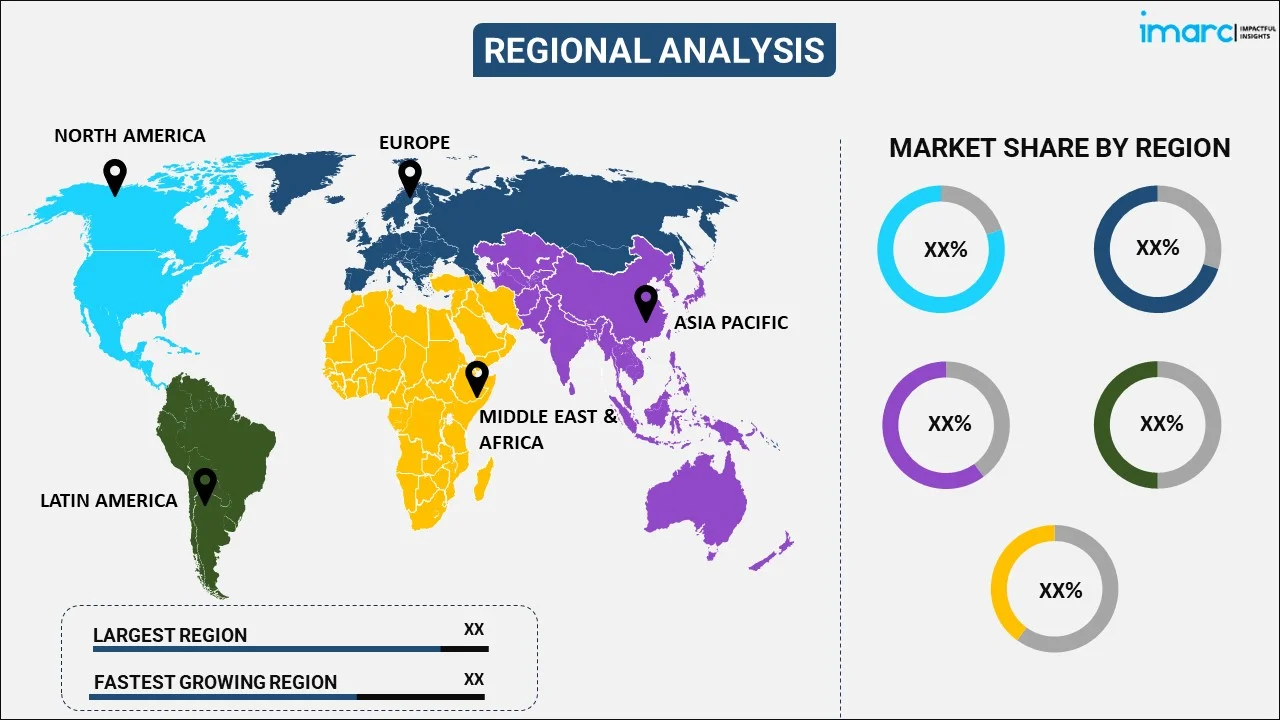
Pyridine Market Report by Product Type (Pyridine N-Oxide, Alpha Picoline, Gamma Picoline, Beta Picoline, 2-Methyl-5-Ethylpyridine (MEP), and Others), Synthesis (Chemically Synthesized Pyridine, Coal Tar Extracted Pyridine), End-Use Industry (Agrochemicals, Pharmaceuticals, Chemicals, Food, and Others), Application (Solvent, Pesticides, Rubber, Medicines, Paints and Dyes, and Others), and Region 2025-2033
Market Overview:
The global pyridine market size reached USD 731.1 Million in 2024. Looking forward, IMARC Group expects the market to reach USD 1,098.4 Million by 2033, exhibiting a growth rate (CAGR) of 4.4% during 2025-2033. The wide product utilization in various research laboratories and academic institutions, growing focus on sustainable practices and environmentally friendly solutions, and escalating pyridine's role in forming coordination complexes are some of the major factors propelling the market.
|
Report Attribute
|
Key Statistics
|
|---|---|
|
Base Year
|
2024 |
|
Forecast Years
|
2025-2033
|
|
Historical Years
|
2019-2024
|
| Market Size in 2024 | USD 731.1 Million |
| Market Forecast in 2033 | USD 1,098.4 Million |
| Market Growth Rate (2025-2033) | 4.4% |
Pyridine is a heterocyclic organic compound with a chemical formula C5H5N. It is a colorless liquid with a distinctive, pungent odor. Pyridine is primarily known for its role as a versatile solvent and reagent in various chemical reactions. It is characterized by a six-membered ring containing five carbon atoms and one nitrogen atom. Due to its basic nature, pyridine forms salts with acids, making it useful in pharmaceuticals and agrochemicals. It finds application in a range of industries, including pharmaceuticals, agrochemicals, and the production of various chemical compounds. It serves as a precursor in the synthesis of medicines, pesticides, and other valuable compounds.

The wide utilization of pyridine in various research laboratories and academic institutions as it serves as a crucial reagent for organic synthesis and analytical chemistry is driving the global market. Furthermore, pyridine-derived compounds exhibit pharmacological activities, making them valuable in drug discovery efforts. The ongoing demand for novel pharmaceutical solutions and therapies contributes significantly to the sustained demand for pyridine. Advances in research and development activities are instrumental in driving the pyridine market. Pyridine's unique chemical properties and versatility make it an essential tool in scientific investigations. It serves as a catalyst and reactant in the development of innovative materials, ranging from specialty chemicals to advanced electronics and manufacturing materials. Additionally, pyridine's role in forming coordination complexes and its reactivity enables explorations in materials science and sustainable technologies. As researchers seek environmentally friendly processes and solutions, pyridine's applications become increasingly relevant, driving growth in the market. With a growing focus on sustainable practices and environmentally friendly solutions, the chemical industry seeks alternatives that have lower environmental impact. Pyridine's role in green chemistry initiatives, such as solvent replacement and cleaner manufacturing processes, positions it as a contributor to addressing environmental concerns and aligns with market demands for more sustainable solutions.
Pyridine Market Trends/Drivers:
Rising Product Demand in Pharmaceutical Industry
Pyridine's versatile properties make it an essential component in the synthesis of a wide array of pharmaceutical compounds. As a solvent and reagent, pyridine plays a pivotal role in facilitating chemical reactions required for the production of medications. Its ability to form salts with acids and participate in complex chemical transformations is harnessed in drug manufacturing processes, aiding in the creation of innovative therapies. Furthermore, pyridine-derived compounds exhibit pharmacological activities, rendering them crucial in drug discovery endeavors. The rising global health concerns and the continuous pursuit of novel pharmaceutical solutions fuel the demand for pyridine in this sector. As a thought leader and expert in market research and consulting services, acknowledging the symbiotic relationship between pyridine and the pharmaceutical industry is vital. It underlines the market's dependence on advancements in medical science and highlights the role of pyridine as an enabler of cutting-edge therapies.
Growth of the Agrochemical Industry
Pyridine and its derivatives find substantial use in the formulation of pesticides and herbicides, contributing to effective crop protection and enhanced agricultural productivity. As a key ingredient in the creation of these essential agrochemical compounds, pyridine's role in pest control and disease management is indispensable for ensuring food security and sustainable agricultural practices. The expanding global population and the increasing need for higher crop yields create a growing demand for innovative agrochemical solutions, thereby elevating the demand for pyridine. The intricate connection between pyridine and agrochemicals underscores the market's responsiveness to shifts in agricultural practices and environmental considerations. Recognizing pyridine's contribution to agrochemical advancements underscores the market's reliance on solutions that promote agricultural sustainability.
Increasing Research and Development Initiatives
Pyridine's versatility and unique chemical properties make it a valuable tool in scientific investigations, catalyzing the discovery of new compounds and applications across diverse industries. Researchers leverage pyridine's role as a catalyst and reactant to develop innovative materials, ranging from specialty chemicals to advanced materials used in electronics and manufacturing. Moreover, its participation in the formation of coordination complexes and its reactivity further enable explorations in materials science, offering potential breakthroughs with far-reaching implications. The global pursuit of sustainable technologies and the demand for environmentally friendly processes also drive research into pyridine's applications. Also, acknowledging the pivotal role of pyridine in pushing the boundaries of chemical innovation highlights the market's interconnectedness with scientific progress and technological advancements.
Pyridine Industry Segmentation:
IMARC Group provides an analysis of the key trends in each segment of the global pyridine market report, along with forecasts at the global and regional levels from 2025-2033. Our report has categorized the market based on product type, synthesis, end-use industry and application.
Breakup by Product Type:

- Pyridine N-Oxide
- Alpha Picoline
- Gamma Picoline
- Beta Picoline
- 2-Methyl-5-Ethylpyridine (MEP)
- Others
Pyridine N-oxide dominates the market
The report has provided a detailed breakup and analysis of the market based on the product type. This includes pyridine N-oxide, alpha picoline, gamma picoline, beta picoline, 2-methyl-5-ethylpyridine (MEP) and others. According to the report, pyridine N-oxide represented the largest segment.
Pyridine N-oxide is a chemically significant compound that arises from the oxidation of pyridine, resulting in the incorporation of an oxygen atom. This transformation imparts distinct chemical properties, rendering Pyridine N-oxide particularly valuable for various applications. Its significance is underscored by its widespread use in pharmaceuticals, agrochemicals, and other industries. In the pharmaceutical sector, Pyridine N-oxide plays a pivotal role in drug development and synthesis. Its unique chemical structure enhances its pharmacological properties, enabling its incorporation into drug molecules with targeted effects. This makes it a key intermediate in the production of medications designed to treat various ailments, including neurological disorders, cardiovascular diseases, and cancer. Additionally, its application as a reagent in organic synthesis and as a catalyst in chemical transformations further elevates its importance in the pharmaceutical field.
Breakup by Synthesis:
- Chemically Synthesized Pyridine
- Coal Tar Extracted Pyridine
The report has provided a detailed breakup and analysis of the market based on the synthesis. This includes chemically synthesized pyridine and coal tar extracted pyridine.
Chemically synthesized pyridine is manufactured through well-established chemical processes that involve the reaction of various precursor compounds to yield pyridine. This method offers precise control over product quality, purity, and yield. Chemically synthesized pyridine finds extensive applications across pharmaceuticals, agrochemicals, and other industries. Its consistent production allows for tailored modifications to meet specific requirements in diverse applications.
On the other hand, coal tar extracted pyridine represents a significant synthesis segment due to its historical significance and versatility. Derived from the distillation of coal tar, this form of pyridine extraction was among the earliest methods employed. Coal tar extracted pyridine carries inherent impurities and variable composition, but advancements in refining processes have improved its purity. This method remains relevant in industries where the specific characteristics of coal tar-derived pyridine are advantageous. It finds applications in sectors such as dye production, where certain impurities contribute to desired color properties.
Breakup by End-Use Industry:
- Agrochemicals
- Pharmaceuticals
- Chemicals
- Food
- Others
Agrochemicals dominate the market
The report has provided a detailed breakup and analysis of the market based on the end-use industry. This includes agrochemicals, pharmaceuticals, chemicals, food, and others. According to the report, agrochemicals represented the largest segment.
Agrochemicals formulated with pyridine offer several advantages, including targeted action, improved efficiency, and reduced environmental impact. Pyridine's ability to enhance the bioavailability and absorption of active ingredients in agrochemical formulations contributes to their efficacy. Additionally, its role in optimizing the controlled release of these compounds improves the sustainability of agricultural practices by minimizing excessive chemical application. By understanding the symbiotic relationship between pyridine and agrochemicals, stakeholders gain insights into trends that impact crop protection and agricultural sustainability. Recognizing the agrochemical industry's dominance as an end-use segment within the pyridine market contributes to comprehensive market analysis, strategic decision-making, and the facilitation of meaningful dialogues aimed at optimizing agricultural practices for the betterment of societies worldwide.
Breakup by Application:
- Solvent
- Pesticides
- Rubber
- Medicines
- Paints and Dyes
- Others
The report has provided a detailed breakup and analysis of the market based on the application. This includes solvent, pesticides, rubber, medicines, paints and dyes and others.
As a solvent, pyridine serves as a versatile and essential component in a wide range of chemical reactions. Its unique properties, including its polarity, ability to dissolve diverse compounds, and reactivity, make it an indispensable medium for reactions in pharmaceuticals, agrochemicals, and fine chemicals. Pyridine's solvent properties facilitate the synthesis of complex molecules, aiding in the creation of pharmaceuticals and specialty chemicals. In the realm of pesticides, pyridine plays a crucial role in the formulation of effective crop protection solutions. Pyridine-based pesticides and insecticides are renowned for their ability to target pests and diseases that threaten agricultural yields. These formulations leverage pyridine's chemical properties to enhance the bioavailability and effectiveness of active ingredients, ensuring that crops remain resilient against a spectrum of threats.
Breakup by Region:

- Asia Pacific
- Europe
- North America
- Middle East and Africa
- Latin America
Asia Pacific exhibits a clear dominance, accounting for the largest pyridine market share
The market research report has also provided a comprehensive analysis of all the major regional markets, which include Asia Pacific, Europe, North America, the Middle East and Africa and Latin America. According to the report, Asia Pacific accounted for the largest market share.
Asia Pacific's flourishing agricultural sector propels the demand for pyridine-based agrochemicals. The region's vast arable land and growing population necessitate effective crop protection measures to ensure food security. As a result, the consumption of pyridine in the formulation of pesticides and herbicides has increased, augmenting the region's position as a dominant force in the market. Strategic government policies that foster industrial growth and investments in research and development have also contributed to the Asia Pacific region's prominence. These initiatives have propelled technological advancements, enabling manufacturers to produce pyridine and its derivatives efficiently and in large quantities. As a result, the region has solidified its role as a pivotal player in the global pyridine market.
Competitive Landscape:
Several companies are heavily investing in research and development initiatives to innovate and expand their product portfolios. This includes developing new pyridine derivatives, exploring novel applications, and improving the efficiency of production processes. Research efforts often aim to enhance the properties and functionalities of pyridine-based compounds to cater to evolving industry needs. Environmental concerns and regulations are driving companies to adopt more sustainable practices. Companies are exploring ways to minimize waste, reduce energy consumption, and implement cleaner production methods. This includes developing greener synthesis processes, optimizing resource utilization, and implementing eco-friendly technologies. Leading players are offering customized solutions to cater to specific industry requirements. This involves collaborating closely with clients to develop pyridine-based compounds tailored to their unique needs, enabling improved performance and efficiency in various applications.
The report has provided a comprehensive analysis of the competitive landscape in the market. Detailed profiles of all major companies have also been provided. Some of the key players in the market include:
- Vertellus Holdings LLC
- Red Sun Co. Ltd.
- Jubilant Life Sciences Ltd.
- Lonza Group Ltd.
- Resonance Specialties Limited
- Shandong Luba Chemical Co., Ltd.
- Koei Chemical Company, Limited
- Barentz International B.V.
- Weifang Sunwin Chemicals Co. Ltd.
- Novasyn Organics Pvt. Ltd.
- Nippon Steel & Sumikin Chemical Co., Ltd.
Recent Developments:
- In March 2023, Vertellus Holdings LLC Acquires CENTAURI Technologies and Rebrands as Aurorium. It represents the Company’s growth and evolution as a global materials innovation partner with a diversified portfolio of specialty ingredients and performance-enhancing materials.
- In February 2022, A strategic partnership was established between Sino-Agri Leading and Red Sun to expand products supply including diquat and glufosinate. The strategic partnership will give a full play of the business advantage of Sino-Agri Leading as a national-level enterprise in the fields of pesticide distribution and plant protection service.
- In November 2021, Vertellus Holdings LLC Completes acquisition of specialty ingredients businesses from Chemtrade. This acquisition expands Vertellus’ capabilities to manufacture and develop specialty ingredients in the dynamic healthcare and pharmaceutical sectors.
Pyridine Market Report Scope:
| Report Features | Details |
|---|---|
| Base Year of the Analysis | 2024 |
| Historical Period | 2019-2024 |
| Forecast Period | 2025-2033 |
| Units | Million USD |
| Scope of the Report | Exploration of Historical Trends and Market Outlook, Industry Catalysts and Challenges, Segment-Wise Historical and Predictive Market Assessment:
|
| Product Types Covered | Pyridine N-Oxide, Alpha Picoline, Gamma Picoline, Beta Picoline, 2-Methyl-5-Ethylpyridine (MEP), Others |
| Synthesis Covered | Chemically Synthesized Pyridine, Coal Tar Extracted Pyridine |
| End-Use Industries Covered | Agrochemicals, Pharmaceuticals, Chemicals, Food, Others |
| Applications Covered | Solvent, Pesticides, Rubber, Medicines, Paints and Dyes, Others |
| Regions Covered | Asia Pacific, Europe, North America, Latin America, Middle East and Africa |
| Companies Covered | Vertellus Holdings LLC, Red Sun Co. Ltd., Jubilant Life Sciences Ltd., Lonza Group Ltd., Resonance Specialties Limited, Shandong Luba Chemical Co., Ltd., Koei Chemical Company, Limited, Barentz International B.V., Weifang Sunwin Chemicals Co. Ltd., Novasyn Organics Pvt. Ltd., Nippon Steel & Sumikin Chemical Co., Ltd., etc. |
| Customization Scope | 10% Free Customization |
| Post-Sale Analyst Support | 10-12 Weeks |
| Delivery Format | PDF and Excel through Email (We can also provide the editable version of the report in PPT/Word format on special request) |
Key Benefits for Stakeholders:
- IMARC’s industry report offers a comprehensive quantitative analysis of various market segments, historical and current market trends, market forecasts, and dynamics of the pyridine market from 2019-2033.
- The research report provides the latest information on the market drivers, challenges, and opportunities in the global pyridine market.
- The study maps the leading, as well as the fastest-growing, regional markets.
- Porter's five forces analysis assist stakeholders in assessing the impact of new entrants, competitive rivalry, supplier power, buyer power, and the threat of substitution. It helps stakeholders to analyze the level of competition within the pyridine industry and its attractiveness.
- Competitive landscape allows stakeholders to understand their competitive environment and provides an insight into the current positions of key players in the market.
Key Questions Answered in This Report
The pyridine market was valued at USD 731.1 Million in 2024.
We expect the global pyridine market to exhibit a CAGR of 4.4% during 2025-2033.
The rising demand for pyridine across various industries, such as pharmaceutical, chemical, Food and Beverage (F&B), etc., in producing medicines, vitamins, food flavorings, paints, dyes, insecticides, herbicides, etc., is primarily driving the global pyridine market.
The sudden outbreak of the COVID-19 pandemic had led to the implementation of stringent lockdown regulations across several nations, resulting in the temporary closure of numerous end-use industries for pyridine.
Based on the product type, the global pyridine market has been segmented into pyridine N-oxide, alpha picoline, gamma picoline, beta picoline, 2-Methyl-5-Ethylpyridine (MEP), and others. Among these, pyridine N-oxide currently exhibits a clear dominance in the market.
Based on the end-use industry, the global pyridine market can be divided into agrochemicals, pharmaceuticals, chemicals, food, and others. Currently, agrochemicals account for the largest market share.
On a regional level, the market has been classified into Asia Pacific, Europe, North America, Middle East and Africa, and Latin America, where Asia Pacific currently dominates the global market.
Some of the major players in the global pyridine market include Vertellus Holdings LLC, Red Sun Co. Ltd., Jubilant Life Sciences Ltd., Lonza Group Ltd., Resonance Specialties Limited, Shandong Luba Chemical Co., Ltd., Koei Chemical Company, Limited, Barentz International B.V., Weifang Sunwin Chemicals Co. Ltd., Novasyn Organics Pvt. Ltd., Nippon Steel & Sumikin Chemical Co., Ltd., etc.
Need more help?
- Speak to our experienced analysts for insights on the current market scenarios.
- Include additional segments and countries to customize the report as per your requirement.
- Gain an unparalleled competitive advantage in your domain by understanding how to utilize the report and positively impacting your operations and revenue.
- For further assistance, please connect with our analysts.
 Request Customization
Request Customization
 Speak to an Analyst
Speak to an Analyst
 Request Brochure
Request Brochure
 Inquire Before Buying
Inquire Before Buying




.webp)




.webp)












